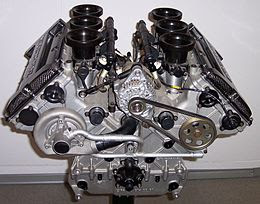An engine is a machine designed to convert one form of energy into mechanical energy.
 |
| Fig. An Engine |
According to they fuel used there are generally two types of engine are used commonly which are-
- Petrol or Gasoline engine or Spark-Ignition engine or S-I engine
- Diesel engine or Compression-Ignition engine or C-I engine
| 1. Petrol or Gasoline engine or Spark-Ignition engine or S-I engine - A petrol engine is a type of internal combustion engine which is designed to run on fuel called petrol or gasoline. In this type of engine spark is made with the use of spark plugs. In most petrol engines, the fuel and air are usually pre-mixed before compression, then it fed to combustion chamber where spark is ignited to burn this mixture and then final drive is taken from crank shaft which are directly connected with the piston and hence final drive is obtained. Fig shows the illustration of this type of engine- |
 |
| Fig. Petrol Engine |
Here ignition is made by spark plug which lies in centre as shown.
2. Diesel engine or Compression-Ignition engine or C-I engine - A diesel engine is a type of internal combustion engine which is designed to run on fuel called diesel. In this type of engine, combustion process takes place with the help of highly compressed hot air instead of using spark plug as in petrol engine.
In the true diesel engine, only air is initially introduced into the combustion chamber. The air is then compressed with a compression ratio typically between 15:1 and 22:1 resulting in 40-bar pressure. This high compression causes the temperature of the air to rise to approx 550 °C, then diesel is injected into combustion chamber in the form of droplets. The fuel is then ignited by the heat from the compressed air in the combustion chamber, which rotate the crankshaft that directly connected to the piston and hence final drive is obtained. Fig shows the illustration of this type of engine-
Here ignition is made by highly compressed hot air as shown.
* In short if you want better acceleration, low maintenance, high speed then go for petrol engine.
* Else go for diesel engine
Advantages of Petrol Engine-
- Lightweight
- Less noise
- Easy Cold Starting
- High speed
- More power
- Low maintenance
- Lower Cost
- Lower Emission
- Better acceleration
- Pre-ignition is possible in petrol engines
- Better power to weight ratio
Disadvantages of Petrol Engine-
- Comparatively Low Life Span
- Lower compression ratio
- Comparatively Lower Torque
In the true diesel engine, only air is initially introduced into the combustion chamber. The air is then compressed with a compression ratio typically between 15:1 and 22:1 resulting in 40-bar pressure. This high compression causes the temperature of the air to rise to approx 550 °C, then diesel is injected into combustion chamber in the form of droplets. The fuel is then ignited by the heat from the compressed air in the combustion chamber, which rotate the crankshaft that directly connected to the piston and hence final drive is obtained. Fig shows the illustration of this type of engine-
 |
| Fig. Diesel Engine |
Here ignition is made by highly compressed hot air as shown.
Advantages of Diesel Engine-
- Compression ratio in a diesel engine is higher
- Diesel engines have more life
- Diesel engines can produce more torque
- Diesel engines can run for longer distances in one shot
- High efficiency
- More mileage because of high compression ratio
- Better economy/mileage
- High durability
Disadvantages of Diesel Engine-
- Require more maintenance
- Pre-ignition is not possible in diesel engines
- Heavyweight
- Produce more noise
- Poorer power to weight ratio
- Lower power delivery at higher rpms
- Tough cold starting
* Else go for diesel engine
No comments:
Post a Comment